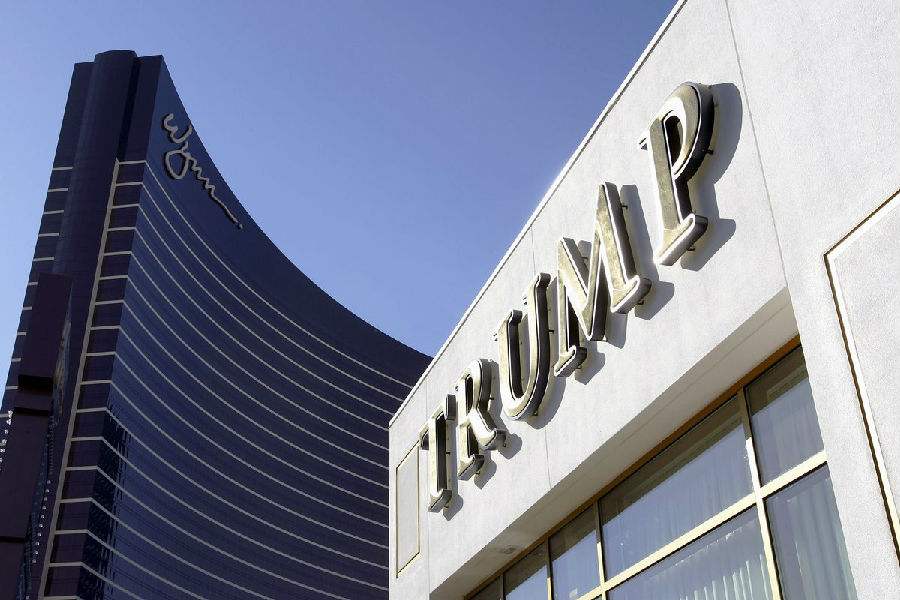Presidential candidate Donald Trump has a stake in hundreds of businesses including hotels and golf courses around the world. While it's still unclear how much the real-estate mogul is actually worth ... there's no denying he's a wealthy man.
總統(tǒng)候選人唐納德·特朗普在全球數(shù)百家企業(yè)中都有股份,包括酒店和高爾夫球場。雖然我們還不知道這位房地產(chǎn)大亨到底有多少錢……但不可否認的是他是個富人。
What happens to all Trump's assets and investments if he becomes the next president of the United States? Will he have to give up his businesses while in office? Well, it's complicated but the answer is no, legally speaking.
如果特朗普成為下一任美國總統(tǒng),他的所有資產(chǎn)和投資會發(fā)生什么變化呢?他在任期間是否必須放棄自己的生意?這很復雜,但從法律上講,答案是否定的。
The Ethics in Government Act of 1978 does not require that the president sell or change how they handle their private businesses. In fact, only unelected officials who serve in the executive branch are prohibited from a business based conflict of interest.
1978年的《政府道德法》并未要求總統(tǒng)出售或改變其經(jīng)營私營企業(yè)的方式。事實上,只有在行政部門任職的未經(jīng)選舉的官員才被禁止從事基于商業(yè)利益沖突的活動。
For example, the Treasury Secretary under George W. Bush had to sell off his Goldman Sachs stock before taking office. But the president is exempt, on the basis that any business holding could be viewed as a conflict of interest since the president holds the highest office and is assumed to have a hand in everything.
比如,喬治·沃克·布什領導下的財政部長在上任前不得不拋售他的高盛集團股票。但總統(tǒng)是不受此限制的,因為任何企業(yè)持股都可能被視為利益沖突,因為總統(tǒng)擔任最高職務,并被認為掌管了一切。
Instead of taking all of the President's business holdings, we as the electorate are expected to trust the person we elect not to act dishonestly. Still, if elected, Trump would be at the very least legally required to disclose all of his holdings, companies and business relationships.
與其讓總統(tǒng)放棄所持有的所有企業(yè)資產(chǎn),我們選民不如去相信我們選擇的人不會采取不誠實的行動。不過,如果特朗普當選,至少法律要求他披露所有持股、公司和商業(yè)關系。

Historically, in order to maintain propriety, presidents have put their investments in a blind trust, which is run by a third party without involvement by the president. Since the 1960s, most presidents have done so. But the problem with blind trusts is that it's really hard to make sure they're blind. And there is a big complication when it comes to Trump: his name.
從歷史上看,為了保持適當,總統(tǒng)們把投資交給全權信托,這種信托由第三方在沒有總統(tǒng)參與的情況下進行管理。自20世紀60年代以來,大多數(shù)總統(tǒng)都這樣做了。但全權信托的問題在于,真的很難確保它們是沒有總統(tǒng)參與的。而在特朗普問題上,也有一個很大的復雜因素:他的名字。
Since his a large source of income is his brand name, it would be impossible for Trump not to notice which buildings and businesses license his name after transferring ownership of it to a blind trust.
由于他的巨大收入來源是他的品牌,特朗普在將其所有權轉(zhuǎn)讓給全權信托后,一定會注意到哪些建筑和企業(yè)為他的名字授權。
Also, if his children run the trust, as he said they will, it would obviously be far from blind. Without Trump selling off the entire Trump Organization and removing his children from the company as well, the conflicts of interest that exist can't truly be mitigated. This is potentially a huge problem, especially concerning Trump's unique political and business relationships.
另外,如果他的孩子們像他說的那樣,將來會管理信托,顯然這遠遠不是沒有總統(tǒng)參與的。如果特朗普不出售整個特朗普集團,也不將他的孩子們從公司職務中移除,現(xiàn)存的利益沖突就無法真正緩解。這可能是一個巨大的問題,特別是在特朗普獨特的政治和商業(yè)關系方面。
Take South Korea for example: Trump recently said that the country should handle its own military defense without any U.S. aid, including the development of nuclear weapons. But in past business dealings in South Korea, Trump partnered with Daewoo Engineering and Construction, a company involved in nuclear energy. Hypothetically, if Trump is elected and follows through with his push for nuclear development in South Korea, Daewoo Engineering and Construction - and therefore the Trump Organization - could potentially make an enormous profit. And this is just one example of potential foreign conflicts of interest.
以韓國為例:特朗普最近表示,韓國應該在沒有任何美國援助的情況下處理自己的軍事防御,包括研發(fā)核武器。但在過去與韓國的商業(yè)往來中,特朗普與大宇工程建設公司有過合作,該公司經(jīng)營核能業(yè)務。假設特朗普當選并繼續(xù)堅持推動韓國的核研發(fā),那么大宇工程建設公司,當然還有特朗普集團,可能會獲得巨大利潤。而這只是潛在外國利益沖突的一個例子。
According to Newsweek, Trump is allegedly connected to business dealings in at least 10 other countries including India, Russia, Ukraine, Brazil and Germany. And The New York Times reports that the Trump Organization owes hundreds of millions of dollars to the Bank of China and Goldman Sachs. But in truth, we don't even know the depth of his businesses and possible conflicts since he hasn't publically released his financial information.
《新聞周刊》報道,據(jù)稱特朗普與至少10個國家的商業(yè)往來有關,包括印度、俄羅斯、烏克蘭、巴西和德國。而《紐約時報》報道稱,特朗普集團欠中國銀行和高盛集團數(shù)億美元。但事實上,我們甚至不知道他的業(yè)務有多深,也不知道可能會發(fā)生什么沖突,因為他沒有公開自己的財務信息。
In essence, if elected, we'd have to trust that he would act in the best interest of the United States, despite the apparent conflicts of interests that would emerge as he engages politically with former partners and foes. Thanks for watching Seeker Daily, please make sure to keep coming back for news every day!
從本質(zhì)上講,如果特朗普當選,我們必須相信他會以美國的最大利益行事,盡管在他與曾經(jīng)的伙伴和對手進行政治接觸時,會出現(xiàn)明顯的利益沖突。感謝您觀看Seeker Daily,請每天收看我們的新聞!












